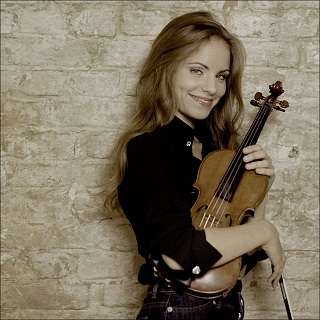|
Back
Homogenous and in fine fettle Zurich
Tonhalle
03/29/2011 - & March 26 (Geneva), 27 (St. Gallen), 28 (Bern), 2011
Antonio Vivaldi: Concerto for violin and cello RV 547
Wolfgang Amadeus Mozart: Concerto for violin and orchestra No. 5 KV 219
Othmar Schoeck: Sommernacht op. 58
Pyotr Tchaikowsky: Serenade for strings op. 48
Benjamin Nyffenegger (cello)
Academy of St Martin in the Fields, Julia Fischer (violin and conductor)

J. Fischer
We simply have to get used to the sight of the Academy of St Martin in the Fields without Sir Neville Marriner, who is over 85. On the evidence of their fine playing in this performance, they hardly need a conductor at all.
Julia Fischer says that she has a very close rapport with this orchestra, starting when, aged only 17, she recorded the Four Seasons(she is now 27). In 2004, during a tour by the orchestra of Germany, Neville Marriner (who formed the orchestra in 1959) told her that she actually did not need a conductor, and two years later she played and conducted the orchestra for the first time. Now she does that annually, but only does so with this orchestra with whom she clearly has a special relationship.
These Migros-sponsored concerts aim at promoting young Swiss talent. In this concert, the opportunity was given to young Swiss cellist Benjamin Nyffenegger who completed his music studies in 2005 in Zurich and who clearly has a bright future ahead of him. Vivaldi’s Concerto for violin and cello came over with exceptional clarity and verve, both soloists clearly enjoying themselves, particularly in the faster rhythmic sections. Nyffenegger was a match for Julia Fischer’s technical skills (Vivaldi himself was a highly accomplished violinist).
The Mozart then gave Julia Fischer her chance to steal the limelight on her own with her technical abilities combining with firm, warm tone, aided no doubt just a touch by her instrument (a Giovanni Battista Guadagnini dating back to 1742). Fischer is known amongst the violinists of her generation as a strict interpreter, and uses very little vibrato. Her technique is impressive and her intellectual command of the works she plays is evident. She says she does not panic if she hits a wrong note, a rare event one can report. She does not aim at cold perfection. The Mozart kept the audience rapt, only occasionally did one miss a conductor, such as perhaps a Norrington, who would have done some orchestral pointing here and there and highlighted the wittier passages of the work.
Swiss composer Othmar Schoeck (1886-1957) is not a composer well known to non-Swiss, and even not to many Swiss. Known mainly for his considerable output of songs, he also wrote a number of operas mostly notably his one-act Penthesilea premiered in 1927 and instrumental compositions including two string quartets and concertos for violin, cello and horn. This composition Sommernacht dating from 1945 was reminiscent of Vaughan Williams or Tippett’s string works, with hints of Debussy and Schoenberg’s Verklärte Nacht but with no hints at modernity. It was dreamy and eerie in turn, but also rather languid and ultimately disappointing. The orchestra probably felt they needed to showcase something Swiss in this series of concerts in Switzerland and rather had to scrape the barrel for an appropriate piece.
Finally, the star of the show, Tchaikovsky’s Serenade for strings. The piece is as romantic as any of Tchaikovsky's other works, and unlike Mozart's serenades, Tchaikovsky's serenade requires an almost full string section to do justice to its sonorities. The Academy showed its potential to the full, all sections shone, although I would like to highlight in particular the fine violas whose burnished tones always impressed, as did the principal cello. Julia Fischer led from the leader’s chair, swaying energetically to ensure the timely entries of the other sections. This was an impressive performance throughout.
We were rewarded by two encores, one at the end of the first half, when Benjamin Nyfenegger came back on stage to join Julia Fischer in a Handel Passacaglia from his Harpsichord Suite in G minor arranged by the Norwegian violinist Johan Halvorsen. It was passionate and technically demanding and brought the house down.
The final encore was a mere morsel, a Gavotte from Janácek’s Orchestral Suite.
The hall was full to the rafters, with string players from the Tonhalle orchestra unable to garner a seat and watching from the aisles. The doors at the rear of the hall had to be opened to allow extra seating to be placed in the corridor, a rare event. All a tribute to the reputation – completely justified on this evidence – of the Academy of St. Martin in the Fields. They are a homogenous band and in fine fettle.
John Rhodes
|